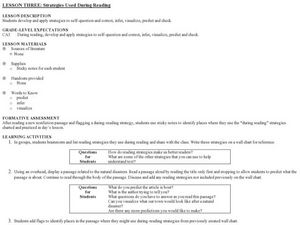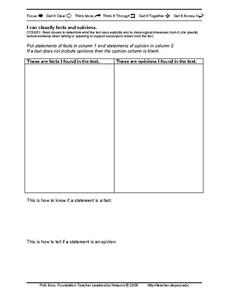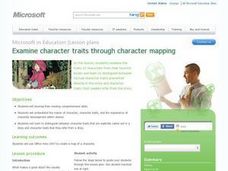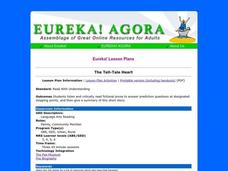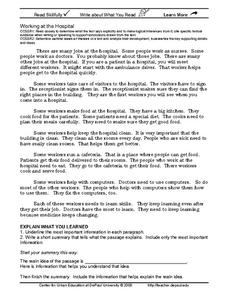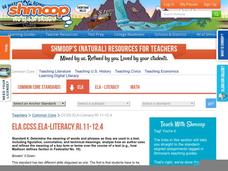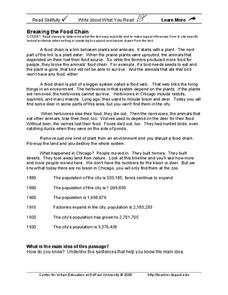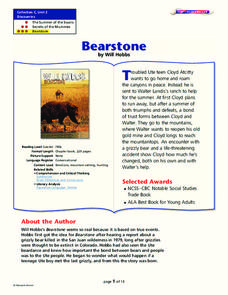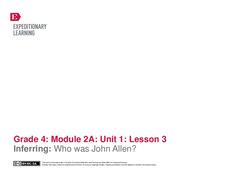Curated OER
Arthur's Reading Race: comprehension skills
In this comprehension skills worksheet, students read the book Arthur's Reading Race and complete comprehension activities. Students complete 5 activities including story elements, making inferences, predicting, and drawing conclusions.
Curated OER
Reading About the Journey: The Odyssey
Young scholars practice their reading skills. In this reading fluency and comprehension lesson, students read instructor-selected passages from The Odyssey following the provided steps for the reading class activity that requires them to...
Curated OER
Strategies Used During Reading
Students try a variety of reading strategies. In this reading strategy lesson, students read a nonfiction passage and put Post -Its to mark the spots where they are using a reading strategy. They focus on inferring, predicting,...
Curated OER
Reading Comprehension Paragraph
In this reading comprehension worksheet, students read a 1-paragraph selection and then respond to 6 short answer questions regarding the selection.
Curated OER
"Jabberwocky": Inferring
Pupils, over an extended time, read and explain the nonsense words of Lewis Carroll's poem, "Jabberwocky". They infer the meaning of the poem using visualizing as well as decoding skills. While written for first graders, this is easily...
Curated OER
Stone Soup
First graders examine the use of logic, deduction, and inference to determine the answers to riddles. They listen to a teacher read aloud of Heather Forest's, Stone Soup before discussing the story which gauges their comprehension....
Curated OER
Poetry: An investigation of Life
AP English Language and Composition requires that class members be able to formulate an argument and support it. Use this resource to focus on the life of Emily Dickinson. It requires individuals to research her life and make inferences...
Polk Bros Foundation
I Can Sequence Important Events
After reading any short informational or fictional text, ask your class to analyze the important events. They note down three important events on a short timeline, describing the events with either words or drawings. After this, pupils...
Polk Bros Foundation
I Can Identify/Infer Motive
Why do people and characters act as they do? Require your class figure out the motivation of two people or characters they read about in a given text. In the short charts, pupils note down who, what they do, and why they do it. After...
Polk Bros Foundation
I Can Classify Facts and Opinions
Telling fact from opinion can be tricky. Direct your class to practice their reading and comprehension skills by taking notes on the facts and opinions in a text. Pupils fill out a two-column chart and write down how they know a...
Curated OER
Examining Character Traits through Character Mapping
Some of what we know about a character is directly stated. Some of what we know is inferred by events in the story. Character maps help primary learners recognize the difference. After modeling with a story your class has read, pupils...
Curated OER
Change of Perspective
After reading an example of a Cultural Connection about a particular person, class members are asked to think about what this person might experience on a daily basis. They then craft a narrative from the subject’s point of view.
Curated OER
The Tell-Tale Heart
Readers listen and critically read fictional prose to answer prediction questions at designated stopping points, and then they give a summary of the short story. This lesson is ideal for English language learners developing English...
Curated OER
Working at the Hospital
Having this reading passage handy to assess your learners' ability to process written text, practice summary with your class, and improve reading comprehension. This passage is about the people who work at the hospital. Learners read...
Shmoop
ELA.CCSS.ELA-Literacy.RI.11-12.4
Determining the meaning of a word based on context clues or marking how the meaning of a term evolves in the course of a document can be a challenge in more complex text. Give your pupils an opportunity to practice this skill with a...
Curated OER
Express Yourself Lesson Seed 9: Climax
Conduct a close reading of chapter 9 of The Cay. Read the chapter again and ask pupils to respond to a list of included text-dependent questions. Finish the class with the provided writing assignment, which asks learners to use textual...
DePaul University
Breaking the Food Chain
Throughout history, the growth of big cities has resulted in the destruction of ecosystems. In the case of Chicago, IL, a grassland that was once home to bison, deer, wolves, and foxes quickly became a booming city of over three million...
Polk Bros Foundation
I Can Locate and Classify Information About a Topic
After reading a text, ask your pupils to recall and organize what they've just learned into a blank three-column chart. Class members write the topic and fill in the columns with information. The sheet also prompts students to write a...
Curated OER
Knights of the Round Table adapted by Gwen Ross
Everyone loves the tales involving King Arthur and his knights. After reading Knights of the Round Table by Gwen Gross, learners draw inferences and conclusions, analyze story elements, and discuss figurative language, including...
Curated OER
Bearstone
Use the story "Bearstone" by Will Hobbs to explore issues related to growing up. In this work, a troubled teen finds himself through an adventure in the wilderness. Learners practice summarizing, drawing inferences and conclusions, and...
Curated OER
The Summer of the Swans
The Summer of the Swans, by Betsy Byars, is a 160-page chapter book about a family going through a difficult time. Complement your reading of Byars' book with this detailed outline of each chapter. Every section includes comprehension...
Curated OER
Sadako and the Thousand Paper Cranes
Have your class explore the effects of war by reading Eleanor Coerr's story, "Sadako and the Thousand Paper Cranes." This is a story about a sixth grader who lives in Hiroshima when the atomic bomb is dropped. Learners answer questions,...
EngageNY
Inferring: Who was John Allen?
Help your learners work with difficult or archaic words. A continuation of lesson two of this module, the plan here focuses on deciphering the Inventory of John Allen, in particular the unfamiliar words that make up much of the list. Add...
Great Books Foundation
The Fox and the Stork
Young readers take part in a meaningful discussion following a reading of Aesop's fable "The Fox and the Stork." Five questions focus on the characters' actions and offering apologies.
Other popular searches
- Making Inferences in Reading
- Making Inferences Reading
- Inferences in Reading
- Reading Inferences 4th Grade
- Reading Inferences 6th Grade
- Reading Inferences Poetry
- 1st Grade Reading Inferences
- Draw Inferences in Reading
- Reading Inferences Handouts
- Guided Reading Inferences
- Shared Reading Inferences
- Make Inferences Reading




